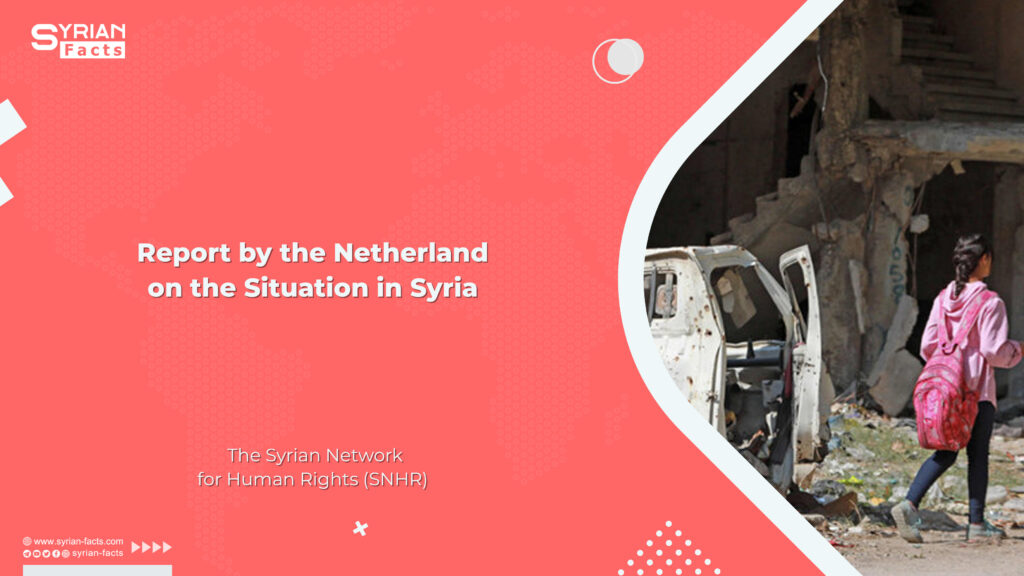In August 2023, the Netherlands’ Ministry of Foreign Affairs released a ‘general country’ report focusing on Syria, mainly in relation to the assessment of asylum requests for people coming from Syria, identifying which course of action should be taken with regard to returning Syrians whose asylum requests were rejected. While the report touches upon a number of subjects, it deals primarily with analysis of the human rights situation in Syria and the political and security developments in the country in the period from June 2022 to July 2023.
The report draws upon a number of human rights sources, ordered by the number of times they were cited in the report as follows:
Syrian Network for Human Rights (SNHR): 48 times. UN Refugee Agency: 18 times. UN Office for the Coordination of Humanitarian Affairs (OCHA): 18 times. Independent International Commission of Inquiry on the Syrian Arab Republic (COI): 16 times.
The report also cites other sources such as the European Asylum Support Office, Human Rights Watch (HRW), and Amnesty International, in addition to reports by the UN Department of Secretary on the status of human rights, as well as other local and international organizations, newspapers, and media outlets.
SNHR has reviewed the 96-page report, which is written in Dutch. Below is a brief summary of the most notable information contained in it:
The report talks about the political and security situation in Syria, with a particular focus on internally displaced persons (IDPs), and refugees returning to the country. In this context, the report confirms that many refugees who have returned to Syria have suffered numerous violations by Syrian regime forces, even if they have agreed to security settlements with the regime.
The report also sheds light on the ever-worsening economic situation, stressing that the humanitarian situation is today the worst it has been since the beginning of the popular uprising. According to the report, over 90 percent of Syrians are living under the poverty line, and over 15.3 million Syrians are in need of humanitarian assistance.
While violence is at relatively low levels compared to recent years in the areas controlled by the different parties involved in the conflict, the report adds, civilians in regime-held areas, including the capital Damascus (described by the report as the most stable area, security-wise), face the constant risk of arbitrary arrest and enforced disappearance at the hands of government forces, in addition to facing harassment and violations by armed militias and criminal groups that enjoy impunity.
in the areas controlled by the Syrian National Army (SNA), the report says that insecurity is rampant amid many bombings and infighting between SNA factions, with the report also documenting cases of arrest, enforced disappearance, and torture.
The report adds that insecurity is also rampant in the areas controlled by Hay’at Tahrir al- Sham (HTS), who continue to perpetrate violations against civilians, including arrests, enforced disappearances and torture.
Furthermore, the report notes that the situation in the areas under the control of the Syrian Democratic Forces (SDF) is no different to other areas, with arbitrary arrests and unlawful attacks leading to human losses taking place regularly. The report also alludes to the SDF imposing restrictions on people’s rights to movement, and to the group’s continuing conscription of children, despite the action plan put in place by the SDF in collaboration with the COI back in 2019.
On the subject of IDPs and refugees’ potential return to their areas, the report notes that many of those who have returned have faced multiple types of violations, including arbitrary arrest, enforced disappearance, and torture, among others. The report stresses that the Syrian regime’s position on the return of displaced persons is self-contradictory – despite the regime issuing calls for refugees to return and coordinating security settlements, returning refugees and IDPs may still face the same violations by Syrian regime forces even after agreeing to these security settlements.
It should be noted that SNHR has been a principal source for the Dutch Ministry of Foreign Affairs’ report on Syria for some years, thanks to the group’s daily monitoring, documentation, and archiving of multiple types of violations in its database. Through this exhaustive and detailed work, SNHR can confidently provide figures that draw upon accumulated data to provide an accurate sense of the magnitude and persistence of violations.
SNHR stresses that it will continue to cooperate and coordinate with UN and international organizations by supplying them with data and information so as to continue to support victims’ rights and expose the perpetrators of violations.
To read the report by the Netherlands’ Ministry of Foreign Affairs in full, please click here (the report is available only in Dutch).





Be the first to write a comment.